


Author: Nino Kvintradze
"This is truly a great achievement by our country. With the European Parliament’s decision, all the benefits associated with European integration will become tangible for our citizens” - these were the words used by the then Chairman of the Parliament, Irakli Kobakhidze, to congratulate the Georgian public for the establishment of visa-free travel for Georgia. The emphasis on the “benefits” of the European Union changed gradually, and nowadays the now Prime Minister of the Georgian Dream calls MEPs “odious” and accuses them of polarization in the country, lies, and insults. The present article examines the benefits that became accessible to Georgian citizens since 2017 and that are currently under threat due to the anti-Western actions of the Georgian government.
The establishment of visa-free travel to and from the EU truly was a great achievement for the country, touching equally on every aspect of its complete functioning and development - from healthcare to education, to strengthening of cultural and economic ties with the West and increasing the reputation of the country on the global political stage. Visa-free travel facilitated the increase in the number of tourists visiting the country, the development of direct flights between Georgia and the EU, the adoption of a free trade agreement (DCFTA) with EU member states, access to Western healthcare for citizens, and many other directions. All of these, in their totality, are the driving force of economic growth and the figures of which the members of the Georgian Dream are so proud today.
Visa Liberalisation Action Plan - Strengthened Legislation
Georgia received the Visa Liberalisation Action Plan (VLAP) from the European Commission in 2013. The Action Plan was split into two stages and four main blocs, resulting in the country implementing numerous fundamental legislative changes:
I. Security of document issuance, including biometric passports.
Personal data protection - adoption of the corresponding legislation and the creation of the Personal Data Protection Service.
II. Migration control, asylum, border control.
Developing the new migration control strategy and action plan;
Modernizing border control - improving border infrastructure and technologies;
Reforming the asylum system - bringing the legislation into line with EU standards;
Preventing the abuse of visa-free travel (effectiveness of the return policy).
III. Public order and safety
Fighting against money laundering and the financing of terrorism - updating the legislation;
Fighting against organized crime, corruption, and human trafficking;
Reforming enforcement bodies and the judiciary.
IV. Fundamental rights
Adopting the anti-discrimination law (one of the most contentious topics in public discussions);
Strengthening mechanisms for human rights protection.
The second stage of the Action Plan encompassed the realization of the adopted legislation - putting the laws into practice and demonstrating their effectiveness, which was followed by the entry into force of visa-free travel for Georgia in March 2017.
Visa Liberalisation - Results in Numbers
As noted above, the establishment of visa-free travel with the EU has a significant impact on the country’s economy: on tourism, aviation, remittances, and free trade.
Tourism
Visa-free travel became the basis for the development of direct flights between Georgia and European countries, which resulted in the entry of numerous European aviation companies into Georgia and accompanying increase in the number of tourists.
The effect of the visa-free travel that went into force at the end of March 2017 was already evident in the second half of the year. The number of visits from EU countries increased by 20% in 2017 when compared to the figures from 2016, and the rate of growth was even higher in 2018. The number of tourists from the EU peaked in 2019 and has not returned to that level since the Covid pandemic.
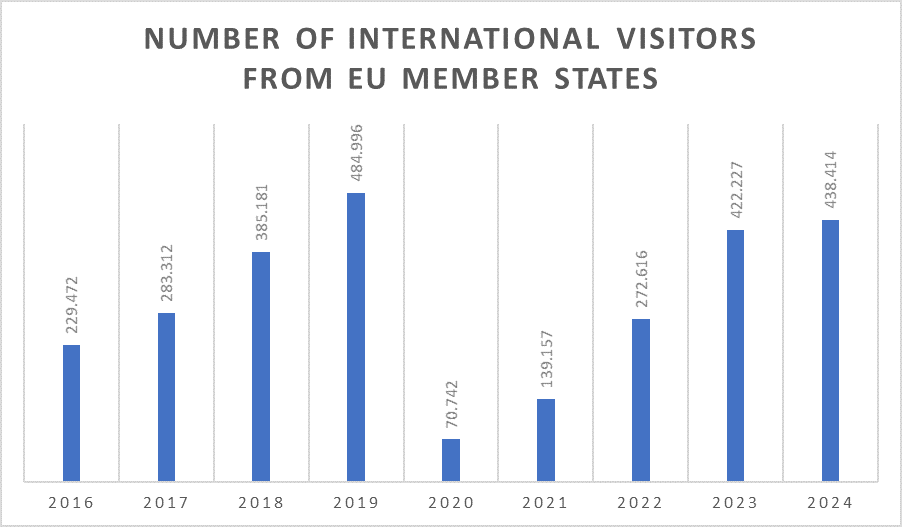
Source: Georgian National Tourism Administration
The growth in the number of tourists was naturally followed by an influx of foreign currency into the country, which is a prerequisite for the stability of the Georgian lari. This in turn contributed to the improvement of the population’s wellbeing. The revenues from tourism in 2017 amounted to about 2.7 billion USD. This figure grew to 3.2 billion USD in 2018. EU citizens are traditionally considered to be high-spending tourists. This has led to the development of tourist facilities in the country and, most significantly, the acceleration of the development of the regions - development of hotels and food facilities in high-mountain settlements, sale of agriculture products, which is oftentimes the only source of income for the local population. According to the data from the National Tourism Administration, representatives of EU countries spend an average of $1300 per visit to the country - in this regard, they are surpassed only by the citizens of Saudi Arabia and Israel.
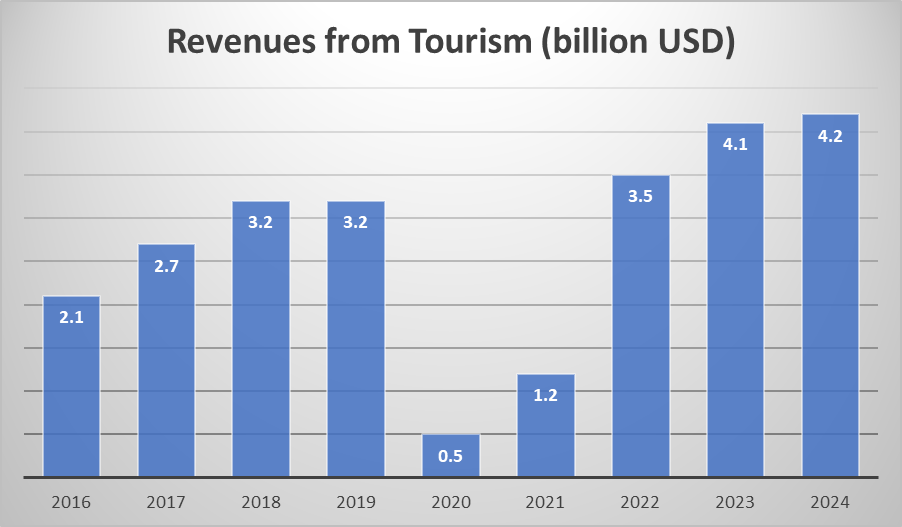
Source: National Bank of Georgia
Foreign Trade - Georgian Products in the EU
The establishment of visa-free travel was preceded by the entry into force of the Deep and Comprehensive Free Trade Area agreement between Georgia and the EU on July 1, 2016 (although it should be noted that some parts of the agreement were in force since September 1, 2014, which allowed Georgia and the EU to begin cooperation and prepare the market for the full entry into force of the agreement). Visa-free travel with the EU plays an important role for Georgian entrepreneurs, allowing them to establish contacts with potential business partners. Although numerous challenges have risen in terms of accessing the EU market and the export figures in recent years have been declining, DAFTA has nevertheless become the basis for the diversification of the economy, development of bio agriculture, improvement of food safety standards, refinement of customs regulations, strengthening support for small and medium-sized businesses, and development in many other areas. The exports of local products to EU countries showed significant growth since the agreement went into effect - in 2019, the share of the EU in the country’s exports exceeded 30% and Georgian entrepreneurs sold products worth over 700 million USD in the West. The exports of local products to the EU underwent the largest decline in 2024 and fell below the 2016 figures.
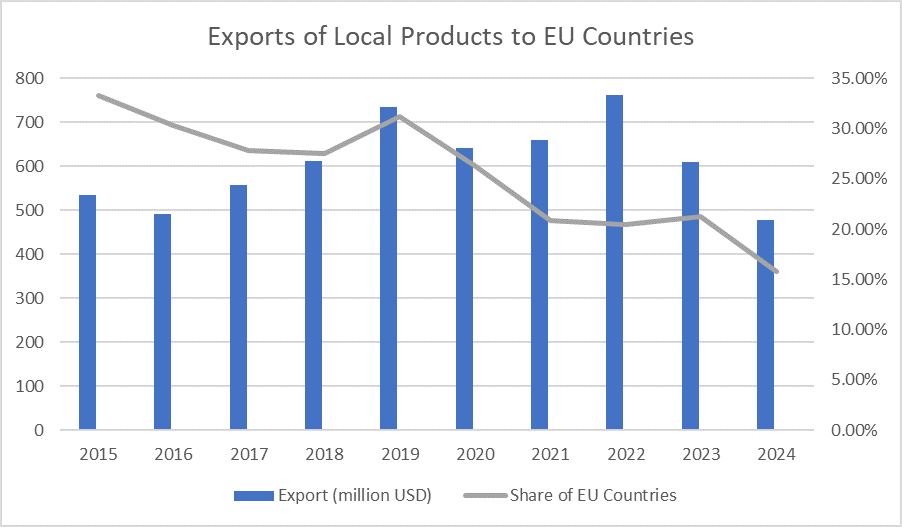
Source: National Statistics Office
Remittances - The Possibility of Legal Employment
visa liberalisation simplified mobility and in some cases created opportunities for temporary employment in the EU. Several countries (Germany, Poland, Lithuania, Estonia, France) created special short-term employment programs for Georgian citizens, mainly for agriculture and seasonal work. Despite one of the goals of these programs being the reduction of illegal migration and the fact that a special visa is required to participate, many Georgians have taken advantage of the opportunity.
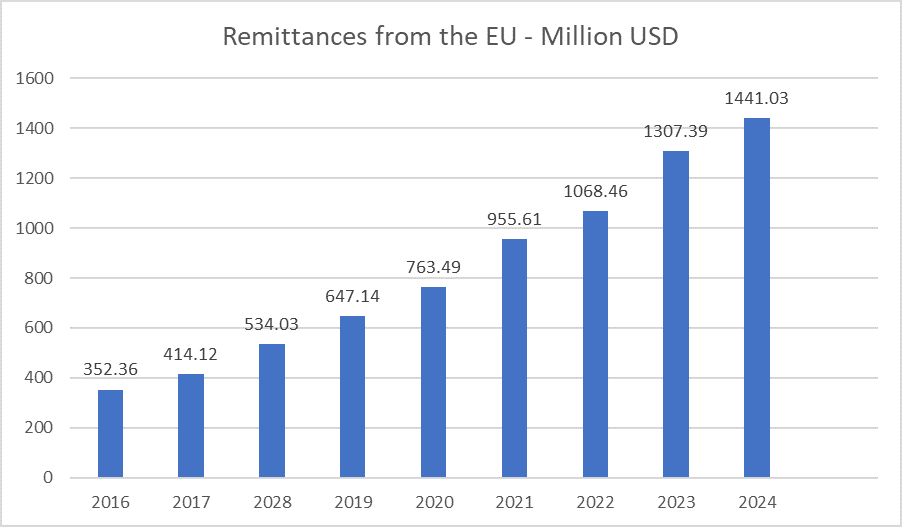
Source: National Bank of Georgia
FDI - European Companies in the Georgian Market
Visa-free travel to the EU and increased direct air traffic have also led to the simplification of establishing business ties. Visa-free travel on its own does not mean a direct link to investment flows, as foreign investors do not need a visa to enter Georgia, but indirect effects should nevertheless be noted, such as global interest with regard to Georgia and the improvement in the country’s image as a country with an open market and deepening ties with the EU. Visa-free travel and the entry of budget airlines into the market have improved physical access to Georgia from European countries. The EU was almost always one of the largest investors in Georgia’s FDI, and since 2017 its share has been maintained at a stable figure (30-35%).
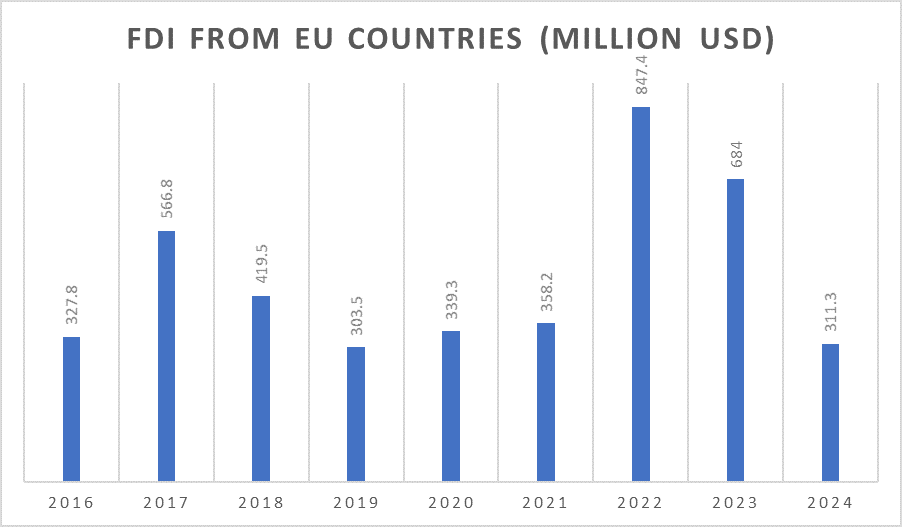
Source: Geostat
Education - Growing Academic Opportunities
Visa liberalisation has led to significant improvements in the area of education as well: improved mobility and simplified travel to and from the EU has directly reflected on the engagement of Georgian students in international exchange programs. While visa-free travel does not directly confer the right to study and long-term study in the EU still requires a special visa, it has still facilitated initial access to European universities, exchange programs, and short-term professional development opportunities.
The participation of Georgian students and academic staff in the Erasmus+ program has grown significantly. Erasmus+ is the largest EU education platform. According to official data, since 2017 the number of Georgian students in the Erasmus+ program has been increasing by an average of 30-50%. While up to 1000 students were participating in the program in 2016, by 2023 this figure has grown to about 5200.
Visa-free travel enabled Georgian youth to participate in various summer schools, education camps, and trainings-seminars held in EU countries. Removing the requirement to obtain a visa for short-term courses means the removal of a significant barrier: nowadays, Georgian students can travel to academic conferences, introductory tours, or short-term professional programs without a visa. Following the introduction of visa-free travel, more bilateral agreements have been made with European universities for joint master’s programs and research projects, especially within the frameworks of Erasmus Mundus and Horizon Europe.
Visa-Free Travel and Growing Access to Quality Healthcare
Following the introduction of visa-free travel, Georgian citizens have found it easier to travel for healthcare reasons to countries with modern medical infrastructure and high-quality services. Many patients have traveled without additional bureaucracy for treatment to European countries that have a higher quality of services like, for example, oncology treatment or complex surgical procedures.
Financial and Technical Aid from the EU
The establishment of visa-free travel with the EU does not represent a single instance of a political agreement - it was based on a partnership that had been strengthened across the years. Within the framework of this partnership, Georgia received political as well as financial and technical support. In parallel to the implementation of the Visa Liberalisation Action Plan as well as in subsequent periods, the EU and its member states, through multi-million grants and programs, supported the reforms that became the basis for the establishment of visa-free travel.
Financial assistance is mainly aimed at sectors such as:
Rule of law and reform of the judiciary;
Public administration transparency and reform;
Development of education and professional skills;
Gender equality and human rights protections;
Development of agriculture and environment protection.
Programs like EU4Georgia and EU4Business played an important role in strengthening the private sector and regional development. Within the framework of EU4Business , in 2023 alone 43.8 million euro was issued to support the growth of small and medium-sized enterprises, which comprised 33.5% of the budget for the entire Eastern Partnership. In 2023, the turnover of EU-supported SMEs in Georgia amounted to 1.8 billion euro, which was 21.8% of the total revenue generated by EU-supported SMEs in the Eastern Partnership countries. There are 39,072 small and medium-sized enterprises in Georgia supported by EU4Business, 58.1% of the total number of small and medium-sized enterprises in Eastern Partnership countries that receive EU support.
In addition, in 2021-2024 alone the EU issued 340 million euro in grants to Georgia within the framework of the Neighbourhood Development and Cooperation Instrument - Global Europe (NDICI-GE). This financial and technical aid is aimed at facilitating the social and economic growth of the country and approximation with EU standards and norms. The aid is distributed among specific areas and encompasses initiatives such as:
Facilitating employment and developing skills - 7 million euro programme focused on skills development matching labour market needs. The program entails professional trainings as well as simplifying contact with employers.
Strengthening civil society in the regions - the project aims to support civil society organizations (CSOs) across 10 regions of Georgia.
Increasing digital participation and rural development - 5 million euro initiative aimed at bridging the digital gap between rural and urban areas in Georgia. Within the framework of the project, public internet spaces were created in 200 villages. The project also entails the development of digital skills among the population.
Government assistance should also be noted - in 2019-2024, Georgian ministries and other governmental bodies received 517 million euro in assistance from the EU.
10 Largest Beneficiaries of the EU in Georgia (2019-2024)
1. €111.55 million — Ministry of Regional Development and Infrastructure, local self-governments
2. €101.4 million — Ministry of Finance
3. €62.75 million — Ministry of Defense
4. €57 million — Ministry of Environment Protection and Agriculture and agencies
5. €30.5 million — Ministry of Economy and Sustainable Development
6. €25.07 million — Ministry of Internally Displaced Persons from the Occupied Territories, Health, Labour and Social Affairs of Georgia and agencies
7. €19 million — State Commission on Migration Issues
8. €12.85 million — Ministry of Education, Science and Youth
9. €10.5 million –- Ministry of Internal Affairs
10. €7.4 million –- Administration of the Government
(The Parliament of Georgia is 11th, with €4.8 million)
Source: European Commission
This is an incomplete list of the financial assistance that the citizens of Georgia have been receiving from the European Union since the country obtained independence and that is now under risk. The anti-Western rhetoric of the ruling party in recent years, the adoption of the Russian-style law, repressions, and violence aimed at civic activists and civil society have repeatedly provoked a sharp reaction from the EU and its member states. These anti-Western actions have already caused the European Commission to freeze financial assistance to the government - government bodies were set to receive 121 million euro from the West, but the programs that were bringing direct benefits to the government have now been suspended.
In addition, several EU countries have stated that they have suspended financial assistance allocated to the Georgian government. For example, Sweden had been issuing 19 million USD in annual assistance to the government. The EU has indicated that the violation of independent institutions and the departure from EU values threaten not only funding, but also the country's candidate status. Whether the programs listed above and the benefits that Georgian citizens receive from the EU will similarly come under risk of suspension is difficult to say today - the EU continues to clearly express its support for the Georgian people and civil society. Nevertheless, the ruling party’s repressive system is expanding.
Conclusion
The removal of bureaucratic barriers has simplified mobility and opened the door to new perspectives in education, healthcare, cultural ties, and civic engagement. Visa-free travel has facilitated the recognition of Georgian culture and its spread in Europe. The removal of the need for a visa has given the private sector and civil society opportunities to establish contacts with Western partners much more effectively and quickly. In addition, visa-free travel has facilitated the process of Georgian citizens internalizing European values and culture. This process, in turn, creates the grounds for European integration.
While visa-free travel does not have a direct impact on investments or employment, it is nevertheless accompanied by processes of international integration and the establishment of an open environment in the country, which naturally contributes to the increase in attractiveness for investment.
Visa-free travel is one of the most important instruments that has shown Georgian citizens what an open European space would mean for them.
The support Georgia has been receiving from the EU for decades is no longer guaranteed. The EU has repeatedly made it clear that support depends on the quality of democratic governance, which is in rapid decline.